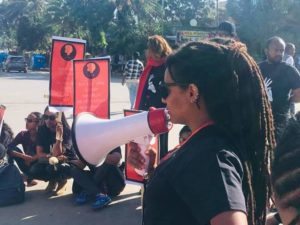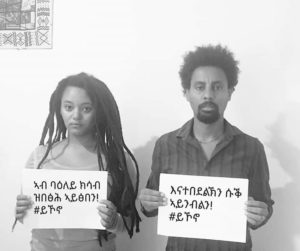In early November 2019, an ordinary meeting on maladministration in a small town near the Ethio-Eritrean border ended abruptly. A woman had revealed she had been raped by a police officer over 14 years ago; the officer had been arrested but released within hours, allowed to continue in his position and relocated to a different station without justice being served. In the same town hall meeting, two women would come forward and reveal that the officer had also had sexual relations with them claiming that he would marry them.
Shocked and disappointed by the stories that were coming out, residents of Adi Daero would come to organize a march asking the government to give justice to the victims of rape and sexual assault. The stories had in fact sent shock waves throughout the regional state. A group of young women and men then organized a rally in the capital of Tigrai, Mekelle. They hoped the women’s stories could pressure the government to take issues of sexual assault more seriously. Furthermore, it creates an opportunity for the community to reflect on rape culture and attitudes that normalize sexual assault.
The demonstration held in Mekelle to raise awareness of the prevalence of gender-based violence in Tigrai, Ethiopia mainly aimed to address social norms and attitudes that normalize rape and other forms of violence against women. The protestors also asked the government and non-governmental organizations to prioritize the fight to end violence against women. Yikono is a Tigraiya word that roughly translates to ‘enough or no more’.
 Along with the protest was a social media campaign mainly addressing four issues; rape culture, domestic violence, workplace harassment and a day dedicated tot he gender-based violence-free world we want to see and what it entails. The camping on rape culture was named “Aytiteqilelen’ a play on the world “teqlila’ which is a practice of marrying a woman to her rapist. Teqlila directly translates to ‘take all of her’, while aytitiqlelin translates to mean ‘she can’t be taken’. The culture is practised assuming it best to marry a woman to a man that she has ‘lost her virginity to’, even when this happens without her consent, as she may not find anyone else to marry her.
Along with the protest was a social media campaign mainly addressing four issues; rape culture, domestic violence, workplace harassment and a day dedicated tot he gender-based violence-free world we want to see and what it entails. The camping on rape culture was named “Aytiteqilelen’ a play on the world “teqlila’ which is a practice of marrying a woman to her rapist. Teqlila directly translates to ‘take all of her’, while aytitiqlelin translates to mean ‘she can’t be taken’. The culture is practised assuming it best to marry a woman to a man that she has ‘lost her virginity to’, even when this happens without her consent, as she may not find anyone else to marry her.
The campaign on domestic violence was named Fikre Aybidilien, which translates to “love is not meant to be painful.” Activists discussed domestic violence; encouraging reflection on how love is communicated and understood in our home; by specifically addressing attitudes that normalize violence in married life. Despite state government strict rules around permitting the organizers of the demonstration, the young people finally marched in the streets of Mekele.
The Yikono campaign was honestly one of the most beautiful things I have witnessed as an activist and why I choose to highlight this movement for African Feminism this month. Choosing to become a feminist for me has been about consistently reflecting on my view of the world and understanding how this perpetuates inequality and dedicating my energy and time to this repetitive process so my children can live with fewer chains and many more options and greater purpose. This, of course, requires me to do a lot of debating, reflecting and reading. It required a lot of exposure and shock from the outside world that allows my mind to be more flexible.
Feminism, for me, has also meant that I have had to learn to articulate these experiencing and attempt to spread that shock factor to the rest of the world around me.
Asking others to ask questions and learn like I have chosen to do. A very important factor for this learning and relearning process is having access to literature and media that can properly articulate how inequality is exercised in our daily lives. Documented theories, ideas, experiences and conversation that enriches your process of thinking and vocabulary.
While I find that the cultures and attitudes in our communities that maintain a state of inequality are similar around the world; there is much room for contextualizing this experience. The shock factor that ignites curiosity for learning and expanding our thinking can only take place when one can place their own experience into this larger picture of why we leave women behind. This requires activists to use the language and examples that are most relevant in the communities where they reside This is especially important for Ethiopian feminists where most Ethiopians don’t speak any international languages.
So little of the literature that is available is reflective and analytical about the movement, most of it written to complete dissertation papers in Universities far from the sight of women and men that can use them to build up their movements and not necessarily written with the intent to communicate how inequality manifests itself in the Ethiopian context.

This is what made the Yikono movement so different for me; the campaign was mostly conducted in Tigrinya (a language spoken in the northern part of Ethiopia and Eritrea) with the organizer discussing equality and what it means to them in their language. It addresses specific cultural practices and communicates the daily routines, attitudes and experiences that compound to maintain a high rate of sexual harassment, second highest in Ethiopia according to the 2016 Ethiopia Health Survey.
There are also additional benefits to the Yikono movement; in a country like Ethiopia and especially a state like Tigrai where the culture of demonstration and democratic practice has not yet evolved it was a meaningful practice for young women and men to take on an agenda so significant.
I was also equally impressed to see men as equals during the organization of the demonstrations and showing up as true allies to the fight against gender-based violence. It also drew on support from activists and media from other parts of Ethiopia with feminists in Addis Ababa joining the campaign although many did not speak Tigrinya.
Yikono organizers later coordinated a campaign on 16days of activism and have been actively participating in different forums. They are currently working to establish a non-governmental organization that works on reducing gender-based violence in Tigrai through different forms of activism.
